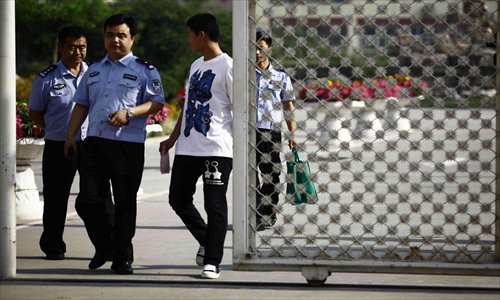Fewer jail sentences for non-local teen offenders

Beijing courts are imposing fewer custodial sentences on juvenile offenders without a Beijing hukou (household registration), some of whom will be given a community supervision order instead of being incarcerated.
However, not all areas of Beijing are able to sentence juveniles to non-residential community correctional facilities, as the individual districts or counties have not put the relevant polices in place.
Li Na, a judge at the juvenile court in Changping district, told the Global Times her court has been making more probation decisions this year, and also allowing non-Beijing juvenile offenders to serve their sentences in the community in their hometowns or in Beijing.
"After the Chinese government released regulations on community correction in February, community correctional facilities are developing in China, which offers us more options when making judicial decisions," said Li.
Li revealed her court has handled 69 cases involving 89 juvenile offenders, 57 of whom were non-Beijingers.
"Out of the 57, 23 were not jailed. This has already changed a lot compared with previous years," said Li.
In past years, almost all juvenile offenders without a Beijing hukou would be incarcerated, according to Li.
"Most of these non-Beijing teenagers are children of migrant workers, whose parents are busy working and thus have no time to teach and restrict them, which finally leads them to commit crime," said Li.
"Due to these safety concerns we could not [previously] send these teenagers back to them, or back to the community in their hometown," said Li.
Jiang Yan, a judge from Chaoyang district's juvenile court agreed that it formerly could be unsafe to send convicted juveniles back to their parents, adding that they would often fail to find the parents of juvenile offenders.
"Some parents just leave their children for years and even their relatives and neighbors don't know how to find them. How can we send offenders back to such places?" said Jiang.
Wan Daqiang, a lawyer from Beijing Shangquan Law Firm, who specializes in child abuse cases, told the Global Times that the new regulations would help to save juvenile offenders from jail.
"One boy was 15 when he helped another rob two students, and was only given less than 100 yuan ($16) by the main offender. He was sentenced to jail for six months, but if his migrant worker parents could have provided sufficient supervision, he would have avoided jail," said Wan.
"It's a shame. Serving terms in the community will help the offender reintegrate into society more easily, while who knows what will happen to them in jail?" said Wan.
Jiang said certainly not all offenders can serve their term in the community.
"We carefully examine the crime to see if it's a severe one. An investigation into the offender to find out whether they intend to repent is also necessary, and of course, a study of whether the offender can be supervised properly in the community," said Jiang.
Once the offender is given a community supervision order, they will be taken care of at a non-residential correction center.
Pan Shiwei, who works at the community correction center in Fengtai district, said the center includes psychotherapy and career training.
"In this way they can assimilate back into society more easily," said Pan.
Hao Nannan, deputy director from the community correction office of Fengtai district bureau of justice, told the Global Times that staff from their office will organize offenders to do community service, and also lead guided tours in real prisons for prevention.
But Zhai Liping, from the juvenile court of Fengtai district court, said that although in theory, non-Beijing juvenile offenders can be given community supervision orders, many areas lack the facilities and policies to carry out these sentences.
"Last month we send a boy back to jail in Heilongjiang Province. Before that we asked the local authority to see whether they could take care of him with community correction, but they said they still have no facilities and policies. I felt really sorry for him," she said.